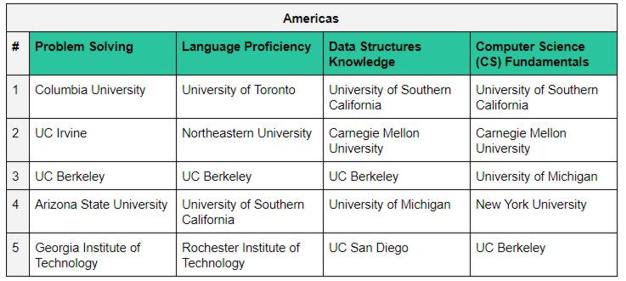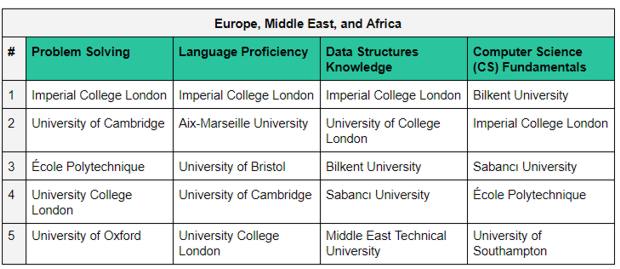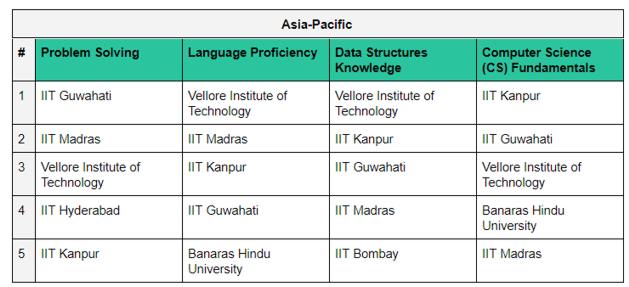| Which Universities Have The Strongest Student Developers? |
| Written by Sue Gee |
| Thursday, 08 August 2019 |
|
HackerRank has released rankings that identify which universities around the world have students with the strongest key developer skills. The rankings reveal that the best student developers attend universities that emphasize practical skills, and that student performance doesn’t always align with university reputation. HackerRank is a developer hiring platform that uses coding challenges to help businesses evaluate software developers based on skill. It has a community of close to 6 million developers which is more than 20% of the global developer population and has 1,500 customers across all industries, including five out of the leading eight commercial banks in the US. Its findings about universities therefore provide useful information about where technical recruiters can find a good supply of new talent to fill the growing number of jobs that require software development skills. The other side of the coin is that the rankings enable would be students to discover the best universities from which to get head hunted. Although this might seem to be the repeat of HackerRank Reveals Which Universities Have Best Coders which we reported in 2016, the two exercises are very different. While the original rankings were based on a skills competition, which attracted 5,550 from 126 universities/colleges/schools around the world. This time around the test takers were unaware they were taking part in a ranking exercise, concentrating instead on performing well to land a job. The analysis is of 1.46 million assessment attempts, administered by employers as a part of their tech hiring processes for both full time positions and internships, made between January 2017 and June 2019, by university students,from 409 universities from 176 different countries. From the data HackerRank identified the four key technical skills employers need most in interns and new grads: problem solving, language proficiency, data structures knowledge, and computer science (CS) fundamentals. Clarifying the methodology HackerRank explained that to rank the scores across different tests, a normalized “weighted score” was computed taking into account the question difficulty and discounting questions that do not have a significant number of attempts. For each skill and language within a university, HackerRank then identified the “top students” based on the university size, and score distribution. The final university rankings are a function of the median weighted scores of these students and the actual count of students that qualify as top students. The results were then presented by region: While "the Americas" technically includes Brazil and other South American countries with a strong presence in coding competitions, all the universities in the Top 5 are in the USA, apart from the University of Toronto in Canada. Looking back to 2016 the top 5 worldwide were as follows:
The only university to figure in both rankings is UC Berkeley, which in this latest exercise ranked in the top 5 for all of the four key technical skills. Pointing out that it didn't earn a spot amongst the latest Computer Science (CS) program rankings in Times Higher Education, CEO Vivek Ravisankar comments: So what makes UC Berkeley’s developers strong? It likely comes down to a combination of its CS curriculum and prominent developer culture. Through their academics, they emphasize “large interdisciplinary real-world system projects” as a core component of its program. Outside of class, they’re able to participate in their robust developer community through a wide variety of clubs. He also notes that 246 unique employers have targeted UC Berkeley for technical talent via HackerRank, making them the most popular school for university tech talent sourcing in the world. And given that UC Berkeley reports that 79% of its CS graduates are employed upon graduation, it seems to be a win-win situation.
The UK dominates the EMEA region although France is also represented and the surprise inclusion is Turkey. Commenting on this table Ravisankar notes: Imperial is highly regarded on top CS program lists (such as Times Higher Education, which ranks it as the #11 CS program in the world). With a heavy educational focus on science and engineering across the university, Imperial’s CS program focuses on helping students learn through “an emphasis on practical work,” including a variety of group and individual projects that emphasize “transferable problem solving skills, rather than the teaching of specific technologies.” Unlike its peers in the EMEA rankings, Imperial is unique in that it has a high volume of international students—56%, to be exact. Ranking amongst #501-600 in the Times Higher Education top CS program list, Bilkent University (Turkey) is lesser known amongst university recruiters. In fact, Bilkent University was targeted by only 18 unique companies via HackerRank. When compared to more popular university targets—like Imperial, for example, who was visited by 39 unique employers over the same time period—it’s clear they may be underutilized in the university recruiting landscape, especially given their strengths in Data Structures Knowledge and CS Fundamentals.
For Asia-Pacific, as far as this ranking is concerned read India. Ravisankar noted the fact that two universities from outside of IIT system were included: Banaras Hindu University and Vellore Institute of Technology (VIT). VIT fared particularly well, securing a first-place ranking across 2 of the 4 key skills and commented: Unlike the IIT system, VIT is a private university based in Vellore. Their educational program focuses on “futuristic technical education” disseminated through 27 unique undergraduate programs. It’s a drastic shift from their reception via Times Higher Education, which places their CS program in the #501-600 ranking globally. The HackerRank report highlights the findings that strong performers in its rankings—like UC Berkeley, VIT, and Imperial—build their curriculums around teaching practical skills with Ravisnkar concluding: "HackerRank’s rankings show the value of practical skills-based curricula and suggest that recruiters shouldn’t limit their search for tech talent just to traditionally high-ranked schools. I would suggest more universities to begin introducing skill-based classes in addition to theory and research-based courses moving forward, which should help grow students’ technical skills"
More InformationWhich Universities Have the Strongest Developers in the World? Related ArticlesHackerRank Reveals Which Universities Have Best Coders Language Learning Insights From HackerRank 2019 Survey HackerRank Reveals Where To Find Programming Talent To be informed about new articles on I Programmer, sign up for our weekly newsletter, subscribe to the RSS feed and follow us on Twitter, Facebook or Linkedin.
Comments
or email your comment to: comments@i-programmer.info |
| Last Updated ( Saturday, 10 August 2019 ) |






